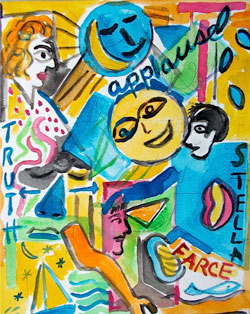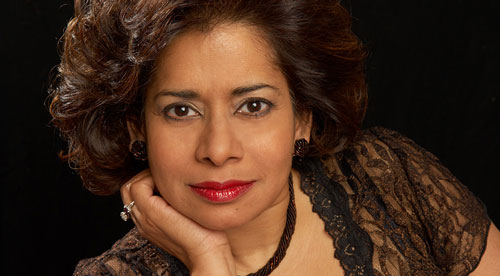
Patricia Rozario
World-renowned opera singer, Ms. Rozario has performed across Europe in “The Marriage of Figaro,” conducted by Sir Georg Solti. She has given concerts in the Royal Opera House, Covent Garden, in “We Shall See Him as He Is” at the BBC Proms in England, and around the world in Amsterdam, Athens, Berlin, Halle, Helsinki, Hong Kong, Cologne, Leipzig, Madrid, New York City, Paris, Riga, Rouen, Strasbourg, Vienna, Winterthur and Zürich. An early appearance was in Moneverdi’s “ll Combattimento di Tancredi e Clorida” at the English National Opera, and she also appeared at the Aix-en-Provence and Wexford Festivals, and the Glyndebourne Festival Opera. Ms. Rozatio performed at the Garsington Opera in England, and on stages across Europe in Aix-en-Provence, Brussels, Frankfurt, Ghent, Innsbruck, Lyon and Stuttgart. She performed in a production of Elvis Costello’s “Meltdown,” and in John Tavener’s operas, “Maria Egiziaca” (“Mary of Egypt”), “Eternity's Sunrise,” “Apocalypse,” in the world premiere of “Vlepondas” at Queen Elizabeth Hall, and “Agraphon” at London's Barbican Centre. Ms. Rozario starred in Tavener’s “Fall and Resurrection.” In the premiere of Opera North’s production of Simon Holt’s “The Nightingale's to Blame,” and in “Arvo Part.” Ms. Rozario has recorded many of the operas she has performed in, as well as Haydn’s “Stabat Mater,” Canteloube’s “Songs of the Auvergne,” Britten’s “The Rape of Lucretia,” “songs of Severac,” Tavener’s “Svyati,” on Graham Johnson’s complete Schubert song series, Handel’s “Almira,” and the Gramophone Award-winning recording of John Casken’s opera, “Golem.” In 2011, with her husband, she created the organization, ‘Giving Voice to India,’ teaching western classical vocal music to Indian students, and in 2014 produced Purcell’s “Dido and Aeneas” with an all-Indian cast at the Royal Opera House in Mumbai. Ms. Rozario has received the Order of the British Empire in 2001, and the Pravasi Bharatiya Samman Award from the Ministry of Overseas Indian Affairs in 2013. She is currently a Professor at the Royal College of Music and Trinity Laban.
How have you been able to remain creative during this enormous crisis?
Having to self-isolate was a huge shock to the system. My husband, Mark Troop, a pianist, and I were on our own as our two children live in a couple of areas of South London. We have stayed home and only go out once a week to shop as quickly as possible. Luckily, we were encouraged to continue teaching our students online and the platforms have all improved greatly. I was able to teach students in China, India, Russia, Europe, UK and in California, which has kept me pretty busy.
My husband and I have gotten into gardening! We sowed a whole range of seeds and plants and are now enjoying, lettuce, courgettes, beans, potatoes, a range of herbs and also strawberries, loganberries, blueberries! We have had a sunny mild spring and the flowers in the garden have been a delight.
Did you have the opportunity to see opera growing up and attend a lot of theater performances. What in particular, did it mean to you to you, to listen to recordings by Maria Callas and Victoria de los Angeles?
I actually grew up in a suburb of Bombay called Santa Cruz, and we would visit Goa almost every year during the summer or autumn holidays. We rarely went to the cinema, had no television, and there were no performances of operas at that time.
However, my mother, Ena, played the piano very well and father, Collin, played the classical guitar and they both sang well and loved music. My parents and their friends used to put on Gilbert and Sullivan operas and musicals in which people from the area took part.
They were put on to raise money for the local schools, and the church, and we enjoyed seeing these shows. My mother produced “Oliver,” she played the music and was the director, and my father, my four brothers and I, (I was sixteen years old at the time,) we all took part in it, which was a wonderful experience.
The adults in the parish organized a music and drama festival each year and every child from the age of seven could take part in different categories – singing, piano, violin, classical and pop or jazz. Children’s choir and adults’ choir, children’s plays and adults plays. I look back on these times and consider them my training ground for a life in performance and communication.
My father worked for Alitalia airways and his work took him to Italy and the UK, where he find and bring back records of opera singers and music scores. He listened to Maria Callas and Victoria de Los Angeles, and various other greats, late into the evening when we children were in bed.
I remember listening to this powerful music that floated into my room through closed doors, and I found myself moved to tears by the emotion and quality in these voices and in the music. Little did I know where my path would lead me.
Patricia Rozario in Wolfgang Amadeus Mozart’s “Don Giovanni”
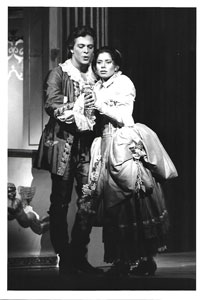 At the Guildhall School of Music and Drama, you were taught by Walter Grüner and received the Guildhall School's Gold Medal and the Maggie Teyte Prize. How would you describe the rigorous training you were introduced to and did it give you the grounding you needed when you began singing professionally?
At the Guildhall School of Music and Drama, you were taught by Walter Grüner and received the Guildhall School's Gold Medal and the Maggie Teyte Prize. How would you describe the rigorous training you were introduced to and did it give you the grounding you needed when you began singing professionally?
I was very fortunate to be introduced to Walter Gruner who developed a love of German lieder in me. I had a lot of catching up to do as my classmates had grown up with classical music and performed a lot in school. I had grown up on a diet of songs from Musicals and had only studied French at school and college.
I worked long hours at the Guildhall, listening to and learning new repertoire in Italian, German, French and English. Luckily, I was good at Competitions and won several prizes at Guildhall School, and later in Spain, Austria, Holland and the UK. That was how I started getting work in the profession, and eventually an agent.
In 1991, you auditioned for a role in Sir John Tavener’s new opera “Maria Egiziaca” (Mary of Egypt).What did it mean to you to work with Sir John Tavener? How did it challenge you as a singer?
In the early 1980’s, I heard about John Tavener and that he composed spiritual music which I was very keen to perform, but I didn’t make any effort to contact him because he was quite an established composer and I was just starting my career as a singer. Looking back, I don’t think I was experienced enough to perform his music at the highest level.
Ten years later, I was an experienced performer with a sound vocal technique, and by then I could adapt my singing to produce and control the pure tones that he required for his music. His music seemed to fit like a glove despite being technically challenging.
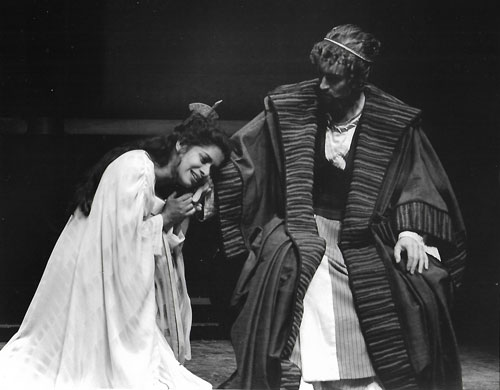
Patricia Rozario in Wolfgang Amadeus Mozart’s “Idomeneo”
You performed in several of Sir John Tavener’s work including starring in “Fall and Resurrection” for the World Premiere performance of his epic work written for the new millennium, at St Paul's Cathedral, London, in January 2000. How did you prepare, and what did this particular work mean to you personally?
By 2000, John Tavener had written over a dozen pieces for my voice which I had premiered in very significant venues like the Megaron in Athens, several BBC Proms at the Albert Hall, Wigmore Hall, Spain, Amphitheater in Ephesus, the Ancient Arena in Delphi and many others.
With every new piece, John’s music became more and more challenging, and I had to work very hard to deliver the music the way he wanted to hear it. ‘Fall and Resurrection” was one of his Epic pieces, which was very low in tessitura and also extremely high in other sections.
Long melismatic phrases which needed to be sung seamlessly. Luckily John was always happy to work on the music well in advance, and we were able to try out various ways of singing until he heard the sound he wanted. That gave me a lot of confidence in performance, knowing that the composer approved of your interpretation of his music.
Performing at St Paul’s Cathedral was always a thrilling experience and with it being the start of the new Millennium 2000, and in the presence of HRH Prince Charles, an experience never to be forgotten.
Some describe opera as one of the very few art forms that expresses “pure emotion.” What does your performing opera mean to you?
I found opera a difficult art form to master. Coming from India and never having seen or heard much opera before I came to study in London, I found it a challenge to act and bring a character to life on stage.
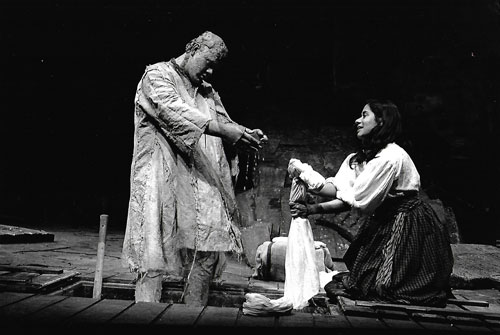
Patricia Rozario in “Golem”
However, the music in opera is so powerful that the more productions I did, the more I was able to find the essence and character in a role. Before I knew it, I was hooked and looked forward to drawing the character through the music and bringing it to life in performance.
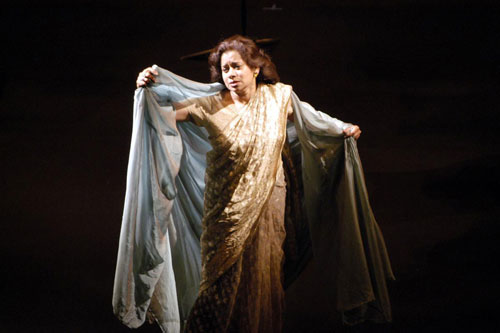
Patricia Rozario
In 2011, you and her husband created the organization, ‘Giving Voice to India,’ teaching western classical vocal music to Indian students. In 2013, ‘Giving Voice to India’ presented a performance of Benjamin Britten’s “the Little Sweep” at the Con Brio Music Festival in Mumbai, the first time an all-Indian cast performed an opera in India. A year later, ‘Giving Voice to India’ produced Henry Purcell’s” Dido and Aeneas” with an all-Indian cast in Delhi, Pune, Panaji at Mumbai’s Royal Opera House.
We started teaching singing from 2009 and visited India at least three times a year at four monthly intervals. It was surprising to see the interest and passion for singing in a fast-growing number of young people from all over India.
At first, we taught and performed at the National Center for Performing Arts (NCPA) in Bombay, plus in Pune, Goa and Delhi. There had been a big change in the minds of parents who didn’t prevent their children from being involved in music, as was common in my youth.
We were struck by the beautiful natural voices we were encountering and the hunger to learn and improve. The difficulty for us was that everyone sang the most famous operatic arias which they weren’t technically equipped to sing. So, it was a question of laying a good foundation technically, and introducing the young singers to a range of beautiful Italian arie antiche, songs and simple arias in German, French and English.
We decided to put on a couple of short operas for the singers to get a taste for it, when their level had improved. After the Britten and Purcell operas at the National Center for Performing Arts, we did a performance at the Royal Opera House Mumbai in 2017 of “Il Matrimonio Segreto”, by Cimarosa, sung in Italian; and in 2018 – Haydn’s “La Fedelta Premiata, also sung in Italian.
You also have toured for several years, giving concerts around the world at some of the most prestigious concert halls. What kind of preparation do you go through? How have you learned the way to align your singing with a symphony orchestra you might have just have a few rehearsals before your performance?
The first performance of any work, be it new or old is always the most challenging. For me, it was always a question of learning the whole score and coaching it with a pianist who could fill in all the other parts, so I felt at ease with the whole piece.
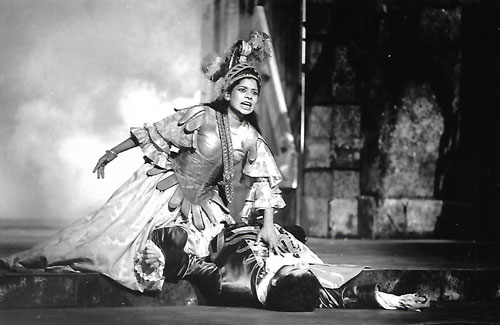
Patricia Rozario in “Rodrigo
Conducting styles vary so much and that takes a bit of getting used to but once the music is flowing I find it easy enough to get my entries.
For the most part, conductors are always keen to establish tempi that suit the singer, but every now and again, you can meet a conductor who has a particular idea about a tempo, and then the singer has to just fall in line and perform within that framework.
Why did it mean so much to you to create ‘Giving Voice to India,’ and were you pleased by how the young Indian singers found their talents come alive in opera?
From my school days taking part in the Music Festival in Santa Cruz, I was always aware of how much natural talent there was, and I had been the lucky one to go abroad and develop my talent and make a career performing. In 2006, I was invited to join the teaching staff at the Royal College of Music, and I found I was able to get very good results from my students and enjoyed developing young talent.
A few years later I heard that the teaching of Singing in India had deteriorated quite considerably, and I was keen to help and try and make a difference. In August 2009, we planned a tour of concerts to Mumbai, Pune, Goa and Delhi, and announced in advance that I would hear anyone who wanted to sing for me the day after each concert.
We were amazed to find thirty-five to forty young singers in each place sign up and come to sing for me and we returned to India in December of that year to start the intensive teaching.
The music scene in India has changed so much and lots of young people are committed to making their lives in music. Now they come to study with us wherever we set up the courses, and I get Indians in the UK, America and Canada also contacting me to guide and help their talented children. It is an exciting time.
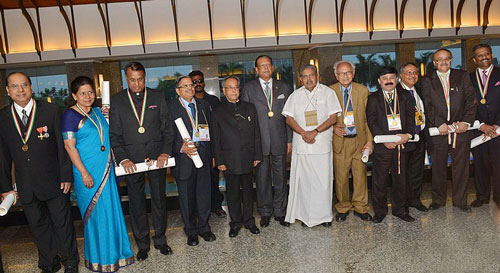
Patricia Rozario, with other awardees, standing with the President of India, receiving the Pravasi Bharatiya Divas Award in Kochi in 2013









































